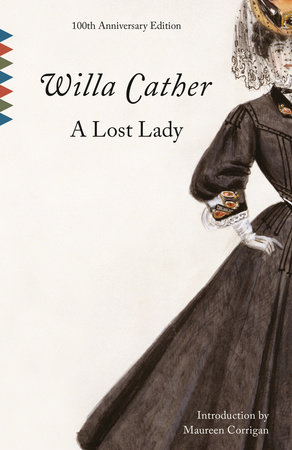Long, long afterward, when Niel did not know whether Mrs. Forrester were living or dead, if her image flashed into his mind, it came with a brightness of dark eyes, her pale triangular cheeks with long earrings, and her many-coloured laugh. When he was dull, dull and tired of everything, he used to think that if he could hear that long-lost lady laugh again, he could be gay.
Niel is a poor boy, a homesteader's son, when he becomes enchanted with the wife of the railroad magnate Captain Forrester. Beautiful, elegant, educated--and of course, rich--Mrs. Forrester becomes an embodiment of all that is sweet and good about the Nebraska outpost of Sweet Water they both call home. Over years, he becomes more and more attached to the Forresters, lingering behind when his own father gives up on his dreams of farming to study law with the Forresters' patronage. But slowly, Niel's ardor for Ms. Forrester becomes disenchanted, as when, having come from the pond with freshly picked prairie flowers, he hears the caddish Frank Ellinger inside Mrs. Forrester's room. He deduces--correctly--that the two are having an affair, and the realization shatters his beliefs: "This day saw the end of that admiration and loyalty that had been like a bloom on his existence. He could never recapture it. It was gone, like the morning freshness of the flowers."
Time is unkind to the Forresters. Captain Forrester is bankrupted by a failing bank, though we learn that his bankruptcy is partially attributed to the fact that he, in his largesse, backed the many small investors with his own money, essentially giving up his own riches so that hundreds would survive. He suffers a series of strokes, leaving Mrs. Forrester to become his caretaker. Money dwindles, and so does their stature, until Mrs. Forrester is compelled to seek investments with shady criminals without her husband's knowledge. The Forresters--both of them--are a representation of the Great West, settled by men of genius and daring, but which in later generations has fallen prey to vicious speculators:
"Because," he roused himself from his abstraction and looked about the company, "because a thing that is dreamed of in the way I mean, is already an accomplished fact. All our great West has been developed from such dreams; the homesteader's and the prospector's and the contractor's. We dreamed the railroads across the mountains, just as I dreamed my place on the Sweet Water. All these things will be everyday facts to the coming generation, but to us--" Captain Forrester ended with a sort of grunt. Something forbidding had come into his voice, the lonely, defiant note that is so often heard in the voices of old Indians.
This is, in all fairness to wonderful Willa, bullshit. The original homesteaders and railroad-builders of the American West might have had a kind of bravery their successors didn't, but it's not hard to see that Cather is engaged in a kind of active myth-making that papers over the atrocities westward expansion required. Note the subtle association of Captain Forrester with the "old Indians" who no longer recognize their homelands, which steps quietly over the question of where the Indians went, who sent them there, and how the railroads that Forrester himself helped to build were involved. Cather's attempts to taxonomize the different generations of pioneers certainly obscures how the covered wagons opened up the trails that became the railroads, and how the railroads brought the prospectors in. On the other hand, there's no shortage of writers who engage in the mythmaking of America, and few of them are as persuasive or skillful as Cather is.
Into the vacuum left by the noble pioneers like Captain Forrester rush lawyers like Ivy Peters, the novel's villain. When Niel and Ivy are boys, Ivy shocks Niel by--in a moment as viscerally horrible as anything I have ever read--catching a woodpecker and gouging its eyes out, laughing as it flaps helplessly in painful darkness. The new Nebraska suits Ivy, and he becomes rich, even buying much of the Forresters' land. He turns the beautiful pond into a wheatfield, not merely for the profit, but because it represents something beautiful over which he now has power, and wants to eradicate. Ivy is one of those "who had never dared anything, never risked anything. They would drink up the mirage, dispel the morning freshness, root out the great brooding spirit of freedom, the generous, easy life of the great land-holders. The space, the colour, the princely carelessness of the pioneer they would destroy and cut up into profitable bits, as the match factory splinters the primeval forest." Tragically, it's Ivy to whom Mrs. Forrester turns with her want of money, further disenchanting poor Niel.
It's hard to love A Lost Lady as one loves O Pioneers! or My Antonia. For one, it's focused on the downfall of the very rich, rather than the striving of the very poor. Yet, those books are made for love and admiration; this one is designed to produce mostly revulsion. Thinking back upon those pioneer novels makes me more sympathetic, actually, to A Lost Lady, which wants me to believe that something noble that was born out in the West has been irrevocably lost.


No comments:
Post a Comment